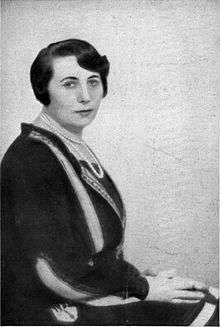Eugénie Sokolnicka
Eugénie Sokolnicka (née Kutner; 14 June 1884, Warsaw – 19 May 1934, Paris) was a French psychoanalyst. An analysand of Freud's, she helped bring psychoanalysis to France in the 1920s, analysing several of the younger psychiatrists at St. Anne's Psychiatric Hospital in Paris.[1]

Eugénie Sokolnicka
She ended her own life, by gas poisoning.[2]
Works
- L'analyse d'un cas de névrose obsessionnelle infantile, 1920
gollark: Is 70 minutes for an entire Death Star THAT bad?
gollark: No.
gollark: Fair.
gollark: Opus has some sort of turtle builder.
gollark: More mining means more... destroyed end islands? I guess that's good.
See also
Notes
- Lionel Bailly, Lacan: A Beginner's Guide, 2009, p.6
- http://www.encyclopedia.com/doc/1G2-3435301385.html
References
- Michelle Moreau-Ricaud: Engénie Sokolnicka et Marie Bonaparte in Topique n0 115, ed.: L'esprit du Temps, ISBN 978-2-84795-205-6
- André Gide, Les faux monnayeurs, Gallimard, 1925
This article is issued from Wikipedia. The text is licensed under Creative Commons - Attribution - Sharealike. Additional terms may apply for the media files.